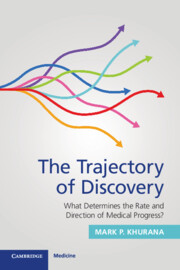Book contents
- The Trajectory of Discovery
- Reviews
- The Trajectory of Discovery
- Copyright page
- Dedication
- Contents
- Figures
- Acknowledgments
- Introduction
- Section 1 Incentives, Context, and Capital
- Section 2 The Financial Determinants of Discovery
- Section 3 Bending the Arc
- Chapter 13 Lobbying and Nudging for Change
- Chapter 14 Scientific Elasticity
- Chapter 15 Death of a Star // New Kids on the Block
- Chapter 16 Great Emergencies
- Chapter 17 Fraudulent Findings
- Chapter 18 Serendipity
- Chapter 19 Converging Paths
- Section 4 Reflecting on the Trajectory
- References
- Index
Chapter 14 - Scientific Elasticity
How Easy Is It to Change the Direction of a Scientist’s Focus?
from Section 3 - Bending the Arc
Published online by Cambridge University Press: 06 April 2023
- The Trajectory of Discovery
- Reviews
- The Trajectory of Discovery
- Copyright page
- Dedication
- Contents
- Figures
- Acknowledgments
- Introduction
- Section 1 Incentives, Context, and Capital
- Section 2 The Financial Determinants of Discovery
- Section 3 Bending the Arc
- Chapter 13 Lobbying and Nudging for Change
- Chapter 14 Scientific Elasticity
- Chapter 15 Death of a Star // New Kids on the Block
- Chapter 16 Great Emergencies
- Chapter 17 Fraudulent Findings
- Chapter 18 Serendipity
- Chapter 19 Converging Paths
- Section 4 Reflecting on the Trajectory
- References
- Index
Summary
Louis Pasteur is considered by many to be one of the most influential scientists in history, with his interests spanning from chemistry to biology to immunology. This type of wandering isn’t uncommon during a scientist’s career, which is often driven by curiosity and a willingness to explore new fields. But how feasible is it to incentivize or force scientists to change their research pursuits, a concept known as elasticity, thus changing the direction of biomedical discoveries? How much would it take to divert a modern Pasteur away from his own natural scientific interests? Chapter 14 explores the costs associated with incentivizing a scientist to pursue new research directions, the extent to which the pharmaceutical industry is elastic, and how we can more generally steer pursuits towards areas society deems important.
Information
- Type
- Chapter
- Information
- The Trajectory of DiscoveryWhat Determines the Rate and Direction of Medical Progress?, pp. 80 - 83Publisher: Cambridge University PressPrint publication year: 2023
